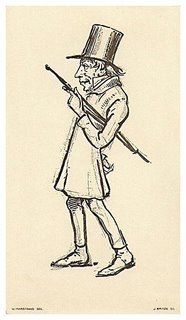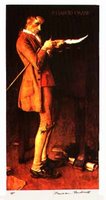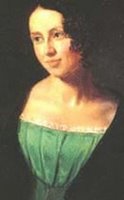THE MELANCHOLY METHOD MAN
Lest this turn into a mutual admiration society — a hall of mirrors, if you will — I should write about something besides a friend.
So how about a great Dane? Not Marmaduke. But Soren Kierkegaard (right).

I think all Danes are great, by the way, not just the great ones. I love Denmark's situation in the world, its geography, its aesthetic. It's the stepping stone between prissy Europe and earthy Scandinavia. I always think of Danes as being a little bit European and a little bit Viking, like the Osmonds are a little bit country and a little bit rock and roll. Shakespeare, without benefit of the Donny and Marie example, spotted this characteristic all on his own and — perfectly — made Hamlet Danish. The Dane is a very precise mixture of doubt and resolve, of paganism and Christianity, of melancholy and ecstasy. Hence all his problems.
My favorite Dane, by far, is the Baroness Blixen. Not just because she wrote the most elegant opening line in the English language — "I had a farm in Africa at the foot of the Ngong Hills" — but because she understood the food-sex connection in literature. Maybe she even invented that connection, as we know it, in "Babbette's Feast." She herself lived on champagne and grapes and eventually died of malnutrition.
I have a lot of superficial thoughts on Kierkegaard before I get down to the deep ones:
1. The lasting achievement from my career as a philosophy major is that I can spell Kierkegaard without looking it up. I can also spell Nietzsche, although I can't use it correctly in a sentence.
By contrast, I bet you $6 that Driftwood, the Last Feminista, had to look up "Kierkegaard" when he mentioned him in the comments section of my last entry. He looked it up, then carefully pecked it out with one finger on his keyboard. (The Last Feminista is way smarter and better looking and more athletic and kinder than I am, so the only way I have to keep him in his place is continual reference to his spelling disability.)
2. Kierkegaard — with his frail looks and his unrequited love — reminds me of Washington Irving's Ichabod Crane. I wonder whether Norman Rockwell had the same impression when he painted Crane (left).

3. Kierkegaard wrote killer love letters. Here's a sample: " ... it seems to me that I should have to possess the beauty of all girls in order to draw out a beauty equal to yours; that I should have to circumnavigate the world in order to find the place I lack and which the deepest mystery of my whole being points towards, and at the next moment you are so near to me, filling my spirit so powerfully that I am transfigured for myself, and feel that it's good to be here."
Wow. He didn't mess around. Is it even possible to write a love letter like that these days? Would your loved one even get it, or would she just glance at it and say something like "Hmmm. Obsess much? Let's watch 'American Idol.'"
4. He loved a woman and gave her up. It's one of the most famous breakups — sacrifices — in Western thought.
 Everyone who talks about Kierkegaard's philosophy mentions Regina at some point. I named my dog after her. Once, long after she was out of his life, he asked her husband for permission to talk with her briefly. The husband said no. No.
Everyone who talks about Kierkegaard's philosophy mentions Regina at some point. I named my dog after her. Once, long after she was out of his life, he asked her husband for permission to talk with her briefly. The husband said no. No. 5. Kierkegaard was critical of the church. He felt it robbed religion of its soul. It reduced something magical and grand to a set of petty rules and empty forms and ugly, uninformed judgments, just like the Christian right has done today.
6. In my study of philosophers, Kierkegaard was the first one who struck me as a real person. He impressed a lot of people that way, I imagine, which maybe has something to do with his being regarded as the first existentialist. You can picture him walking down the street, deciding where to go.
7. He came up with the "Leap of Faith," which strikes me as the most elegant understanding of religious feeling ever articulated. It's beautiful because it's a death knell for and celebration of God all at once. The idea is that faith is meaningless without doubt. If you don't doubt your religious convictions, you are incapable of ever truly believing them. Doubt makes the miracle, like exception makes the rule. It should keep atheists and believers alike happy. But it doesn't.
(Note to self: Invent a cocktail called "Leap of Faith" — one part doubt, two parts conviction. Serve at room temperature with a Hegelian twist.)
Gosh, look at the time. I forgot to spring my clocks forward. And I haven't even gotten to my deep thoughts on Kierkegaard. Words, words everywhere, and not a thought to think.
Oh well. You didn't get to see my profound wisdom on the great Dane, but you did get to see how — with smoke and mirrors — I bullshitted my way through a philosophy degree.

11 Comments:
Ah, but you are so close. When I thought of the Dane in question, I went to Wikipedia, typed in “Either/Or” and, as expected, got our good chap Soren. But all I needed to note was that it was “ie” and then “aa”. My spelling might be atrocious, but my short term memory is not (yet) shot. Oh, the Wikipedia entry was pretty good too. I love Wikipedia, but it is one of several reasons I cannot ever get anything serious done on the computer. Maybe I need software that limits me to no more than three follow on links. As for typing, I use the first two fingers of both hands--four times more than you thought!
I used to describe the leap of faith as depending on circular reasoning much like believing in conspiracy theories. But this is not quite right. Rather it is a lot like going “all in” at a critical point in the game only to discover that people are finger painting instead of playing cards. So you can take the leap if you want to, I’ll take the cocktail.
Regina outlived Soren by nearly fifty years. What do you suppose she thought of him--if at all--decades after his death?
"Pascal's Wager" is the circular conspiracy theory.
I learned about Pascal's Wager — and Occam's Razor — from Mike Young. Remember him?
I like how all the great French philosophes were fun-loving mathematicians.
Oh yes, I remember Young. He was quite a dandy. One time in a large seminar he was dropping his usual lines showing that he was broadly cultured. But he misquoted Mark Twain’s quip about Wagner and instead had him say “Mahler’s music is better than it sounds”. Being ever tactless, I corrected him on the spot. Young didn’t miss a beat and admitted that that would be a stupid thing to say about Mahler.
If you were looking for a spirited philosophical debate, a good bet was to drop by Young’s office. More likely than not, he would push aside his work and give you an hour. The man loved his job.
You must also mix me some of your fabulous cocktails. Do you invent a new one every day? Or is it more just an intuition for the moment: and here is the cocktail for an ingénue who got a bit damp in the April showers... I would like that cocktail, particularly if it is green.
Oh God, that Twain thing reminds me — What did you say about Twain in one of your kid diaries, Erin? You had to read him in school and said something like "Whoever told Mark Twain he was funny should be shot." You saucy little brat.
DW, I'm mixing you a fabulous cocktail right now, while you slumber.
Ah yes, preceded by "I hate Huck Finn."
I've been drinking Nutty Irishmen lately. Baileys and Frangelico. Delicious.
Nutty Irishmen! Fantastic.
Ricky Rock-climber, here's a cocktail just for you. I'm calling it the "Belay," which for you nonrock-climbers is the word used to describe how one climber protects another from falling.
One part trust, one part audacity, two parts crazy. Serve on the rocks.
Sounds like ice climbing.
I took a seminar on Kierkegaard about a year ago. My professor had taken the tour of his house. On the tour they pointed out a large cabinet, an armoir, I suppose. When Kierkegaard broke off his engagement with Regina he graciously offered to let her live in the cabinet instead.
Leslie, welcome.
I'd love to see Kierkegaard's house!
I don't think my philosophy profs ever left their offices. They rarely had good anecdotes.
Post a Comment
<< Home